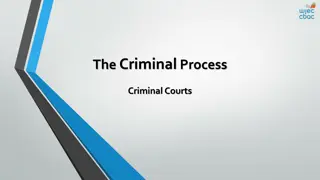Objectives of Criminal Proceedings in Various Legal Systems
The objectives of criminal proceedings aim to ensure justice by acquitting the innocent and convicting the guilty, while also upholding the rule of law, protecting legally recognized interests, and resolving cases efficiently. This overview covers the principles and objectives of criminal procedure in Poland and England, emphasizing substantive and procedural justice as integral components.
Download Presentation

Please find below an Image/Link to download the presentation.
The content on the website is provided AS IS for your information and personal use only. It may not be sold, licensed, or shared on other websites without obtaining consent from the author.If you encounter any issues during the download, it is possible that the publisher has removed the file from their server.
You are allowed to download the files provided on this website for personal or commercial use, subject to the condition that they are used lawfully. All files are the property of their respective owners.
The content on the website is provided AS IS for your information and personal use only. It may not be sold, licensed, or shared on other websites without obtaining consent from the author.
E N D
Presentation Transcript
Principles and Objectives of Criminal Procedure. Phases of criminal process: overview Dorota Czerwi ska
Objectives of Criminal Proceedings - overview Although there are many different legal families and our focus is on two main forms of criminal inquisitorial, surprisingly the declared aim of the criminal process is usually the same and may be basically put as: to acquit the innocent and to convict the guilty process: adversarial and
Objectives of Criminal Proceedings - Poland Normative perspective art. 2 1 CCP: 1. The purpose of this Code is to establish such rules of criminal procedure so as to ensure that: 1) the perpetrator of a criminal offence is detected and held criminally liable and that no person who has not been proven guilty bears such liability; 2) by a correct application of measures provided for in the criminal law, and by the disclosure of circumstances conducive to committing a criminal offence, the tasks of criminal procedure be fulfilled not only in combating crime but also in preventing it, as well as in consolidating the rule of law and the principles of community life; 3) legally protected interests of the injured be secured and that, at the same time, the dignity of the injured be preserved; 4) resolution of the case be achieved within a reasonable time.
Objectives of Criminal Proceedings - Poland Perspective of legal scholars two complimentary aims: substantive justice issuing a judgment which is just towards all the parties and the society procedural justice conducting a procedure which is fair towards the parties and creates equal, real chances of proving their case
Objectives of Criminal Proceedings - England Normative perspective CrimProcRules Part I a) (1) The overriding objective of this procedural code is that criminal cases be dealt with justly. (2) Dealing with a criminal case justly includes (a) acquitting the innocent and convicting the guilty; (b) treating all participants with politeness and respect; (c) dealing with the prosecution and the defence fairly; (d) recognising the rights of a defendant, particularly those under Article 6 of the European Convention on Human Rights; (e) respecting the interests of witnesses, victims and jurors and keeping them informed of the progress of the case; (f) dealing with the case efficiently and expeditiously; (g) ensuring that appropriate information is available to the court when bail and sentence are considered; and (h) dealing with the case in ways that take into account (i) the gravity of the offence alleged, (ii) the complexity of what is in issue, (iii) the severity of the consequences for the defendant and others affected, and (iv) the needs of other cases.
Objectives of Criminal Proceedings - England Legal writing: The aims are: To establish the truth To publicly hear the contest in order to strengthen the respect for legal order To provide a katharsis to the participants To issue a final judgment which gives all the participants certitude as to their legal position
Objectives of Criminal Proceedings - USA No normative regulation Legal scholars: the aim is: To achieve the right balance between the protection of legal goods and individual rights To establish guilt, impose appropriate punishment, properly allocate state resources and legitimise state compulsion by conducting a fair trial
Objectives of Criminal Proceedings - France No explicit normative regulation The main aim: to acquit the Innocent, to convict the guilty Interesting point, common in French legal writing: the aim of criminal proceedings is to reconcile the public interest with that of individuals
Objectives of Criminal Proceedings - Italy No normative regulation Aims: to establish the truth and impose criminal liability on the perpetrator, while providing procedural justice understood as a real chance of standing against the state
Objectives of Criminal Proceedings - Germany No normative regulation To end the conflict To achieve three values at the same time: truth, rule of law and justice To apply the provisions of substantive criminal law
Principles of Criminal Procedure = socially important directives of resolution of the most important issues of criminal process that determine the model and the course of the whole proceedings Usually two variants of resolving such an issue may be distinguished (but that s not always the case)
Principles of Adversarialism v. Non-Adversarialism Similar as accusatorial v. inquisitorial You already know the search for truth the main difference is the role of the court in
Ne bis in idem principle the rule that a person should not be prosecuted or tried twice for the same offence. also called the prohibition of double jeopardy, or autrefois convict, autrefois acquit usually a constitutional right connected to the finality of a previous decision The ban is not triggered by decisions of foreign courts (!), unless a specific act of international law states otherwise and it does in case of the EU Member States!
Principle of Mandatory/Discretionary Prosecution Closely connected to principle of official prosecution (=regardless of the wishes of the victim) The difference lies in whether it is mandatory that the prosecutor mandatorily prosecutes in case of every crime committed or the prosecutor can decide to prosecute or not to prosecute when there is no purpose in prosecution for various reasons Very different attitudes among the legal systems Minor cases (Germany) Possession of small amounts of drugs (Poland) Fulfilling certain obligations which are not penal in their nature (France) General right of assessment by the prosecutor (USA)
The presumption of innocence & the burden of proof Presumption of innocence is one of the core concepts of modern criminal procedure Anyone is presumed until they are proven guilty with a final judgment It is not only addressed to the court or the prosecutor but also to the media and the society as a whole Problem: how does applying detention on remand get reconciled with the presumption of innocence?
The presumption of innocence & the burden of proof Presumption of innocence is connected with the in dubio pro reo rule However, this rule is only triggered after the court has evaluated all the available evidence and still sees some gaps/doubts ? only then they have to be explained to the benefit of the defendant The presumption of innocence also implies the imposition of the burden of proof not on the defendant (who is protected by the presumption) but the prosecutor or the court In inquisitorial procedure, to some extent the burden of proof rests also upon the court In accusatorial procedure, it lies solely upon the prosecutor That is why in the EU criminal law we will not find any specific provisions that would oblige the countries to impose the burden of proof on a particular body
The rights of defence The core is the right to actively or passively defend oneself, including the right to appoint a counsel but it is a package of many different rights interpreted as one There are some countries where being represented by a defence counsel is mandatory for all the defendants (Italy) whereas in others mandatory representation is restricted to certain situations resulting from individual characteristic of the defendant or the case In some countries it includes the right to lie in the defendant s testimony whereas in others the defendant may either tell the truth or remain silent but not lie as it would constitute a new crime It is supposed to make the balance of powers in criminal proceedings more equal but is it enough?
Principle of oral/written proceedings Principle of oral presentation of evidence refers to trial and is supposed to guarantee that the court s judgment is based only upon the evidence they have experienced on their own (which is often seen as a separate principle of direct presentation of evidence to the judge) However, most legal systems contain serious exceptions to that rule Nevertheless, whatever happens orally is recorded either in written minutes or with an audio-video recording so the orality is not an exclusive principle Written proceedings also dominate in the investigation in some countries
Principle of the right to a public trial/secrecy of investigation Those are two contrary principles referring either to judicial proceedings, which are usually investigation, whose interests demand secrecy Openness of trial to the public is protected by the ECHR and many constitutions. Why? However, the law may introduce certain exceptions to conducting trial in public. Why? held in public, and the
Principle of free/legally bound evaluation of evidence Historically: there have once existed strict evidence rules, telling the court how many evidence and of which kind shall be presented in order to prove the guilt There are no such rules anymore; the judge is free to evaluate the evidence without any legal clues as to their number or nature needed However, free does not mean arbitrary the evaluation of evidence has to take into account all the evidence and the rules of formal logic, scientific knowledge and general experience Although it is not called that in Europe, the standard of proof is somewhat similar in most legal cultures and refers to the lack of reasonable doubt as to the guilt
Principle of proceeding without undue delay/within reasonable time This is not an organisational directive but a human right, protected by Article 6 ECHR and many constitutions However, it does not impose any strict obligations to end proceedings within a deadline but rather to proceed as quickly as possible in light of specific circumstances of the case
Principle of appellate review It refers to the duty of the state to provide the defendant with an appeal review at least of a conviction In some countries the right pertains fully to the prosecutor whereas in others awarding the prosecutor with the right to appeal an acquittal would be considered as a double jeopardy Surprisingly, it is not mentioned in the European Convention on Human Rights and Fundamental Freedoms itself; nevertheless, we will find it in Article 2 of Protocol 2 to the Convention and many constitutions What is the purpose of awarding this right?
Impartiality as a principle of criminal proceedings It is obvious that the duty of impartiality rests upon the court However, in adversarial culture impartiality is inextricably connected to being a passive observer, whereas in inquisitorial culture the court is free to engage in evidence proceedings how does it influence impartiality? The other difference between legal cultures connected with impartiality refers to the prosecutor: is the prosecutor supposed to be impartial? Is it possible that he or she in fact is impartial?
Other principles In many jurisdictions you would find more principles mentioned by the legal scholars: e.g. proportionality, dignity, equality (France) You may also discuss principles relating to the composition of the court (such as principle of collectivity or participation of society; judicial independence or the right to a predetermined jurisdiction) Exclusionary rules or evidence rules as a separate category of provisions
Phases of criminal process: an overview investigation (not necessarily considered as a phase of process) judicial proceedings: trial and others enforcement proceedings


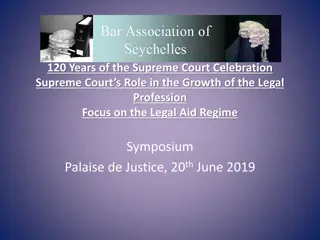
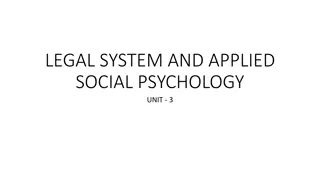




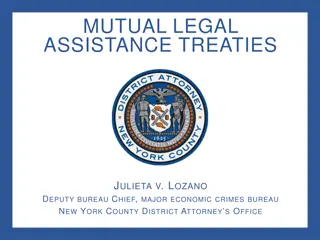
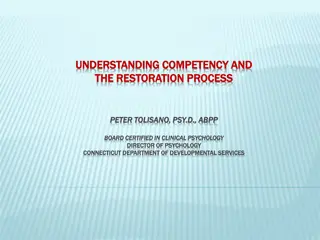
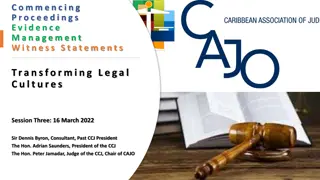
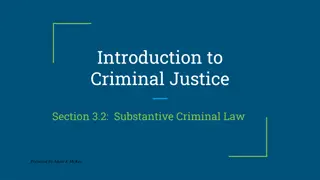
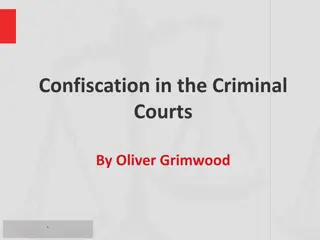

![Briefing on the Criminal Procedure Amendment Bill [B12-2021] to the Portfolio Committee on Justice and Correctional Services](/thumb/157093/briefing-on-the-criminal-procedure-amendment-bill-b12-2021-to-the-portfolio-committee-on-justice-and-correctional-services.jpg)



